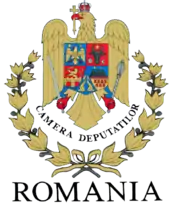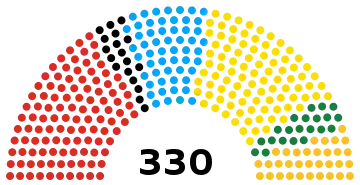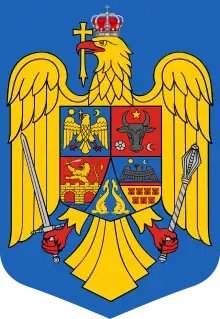Chamber of Deputies (Romania)
The Chamber of Deputies (Romanian: Camera Deputaților) is the lower house in Romania's bicameral parliament. It has 330 seats to which deputies are elected by direct popular vote using party-list proportional representation[1] to serve four-year terms. Additionally, the organisation of each national minority is entitled to a seat in the Chamber (under the limitation that a national minority is to be represented by one organisation only).
Chamber of Deputies Camera Deputaților | |
|---|---|
| 9th Legislature | |
 | |
| Type | |
| Type | of the Parliament of Romania |
| History | |
| Founded | 1862 |
| Leadership | |
| Structure | |
| Seats | 330 |
 | |
Political groups |
Government (169)
Opposition (142) |
| Elections | |
| 1992–2008, since 2016: Closed list, D'Hondt method 2008–2016: nominal vote, Mixed member proportional representation | |
Last election | 6 December 2020 |
Next election | 6 December 2024 |
| Meeting place | |
| Palace of the Parliament, Bucharest | |
| Website | |
| cdep.ro | |
Leadership and structure
Standing Bureau
The (Romanian: Biroul Permanent) is the body elected by the deputies that rules the Chamber. Its President is the President of the Chamber, and he/she is elected for a whole legislature (usually four years). All the other members are elected at the beginning of each parliamentary session.
There is one President, and four of each: Vicepresidents, Quaestors and Secretaries. The current composition is listed below.
| Position | Name | Political party / Group | Incumbent since |
|---|---|---|---|
| President | Ludovic Orban | PNL | 21 December 2020 |
| Vice-Presidents | Cristina Prună | USR-PLUS | 21 December 2020 |
| Laurențiu Leoreanu | PNL | 21 December 2020 | |
| Marius Budăi | PSD | 21 December 2020 | |
| Alexandru Rafila | PSD | 21 December 2020 | |
| Secretaries | Oana Murariu | USR-PLUS | 21 December 2020 |
| Cristian Buican | PNL | 21 December 2020 | |
| Vasile-Daniel Suciu | PSD | 21 December 2020 | |
| Ovidiu-Victor Ganț | FDGR/DFDR (on behalf of all ethnic minority parties) |
21 December 2020 | |
| Quaestors | George Tuță | PNL | 21 December 2020 |
| Dénes Seres | UDMR | 21 December 2020 | |
| Alexandra Presură | PSD | 21 December 2020 | |
| Antonio Andrușceac | AUR | 21 December 2020 |
Committees of the Chamber
Standing committees and current leadership are listed below.
| Committee | President | Group | Incumbent since |
|---|---|---|---|
| Committee for Economic Policy, Reform, and Privatization | |||
| Committee for Budget, Finance, and, Banks | |||
| Committee for Industries and Services | |||
| Committee for Industries and Services | |||
| Committee for Transport and Infrastructure | |||
| Committee for Agriculture, Forestry, Food Industry and Specific Services | |||
| Committee for Human Rights, Cults and National Minorities Issues | |||
| Committee for Public Administration and Territorial Planning | |||
| Environment and Ecological Balance | |||
| Committee for Labour and Social Protection | Oana Țoiu | USR PLUS | 21 decembrie 2020 |
| Committee for Health and Family | |||
| Committee for Education, Science, Youth, and Sport | |||
| Committee for Culture, Arts, Mass Information Means | |||
| Committee for Legal Matters, Discipline, and Immunities | |||
| Committee for Defense, Public Order, and National Security | |||
| Committee for Foreign Policy | |||
| Committee for the Investigation of Abuses, Corrupt Practices, and for Petitions | |||
| Committee for Standing Orders | |||
| Committee for Information Technology and Communications | |||
| Committee on Equal Opportunities for Women and Men | |||
| Committee for Romanian Communities Living Abroad | |||
| Committee for European Affairs |
Party composition
 |
|---|
| This article is part of a series on the politics and government of Romania |
2016–2020
Seats in the Chamber of Deputies of Romania
| Party | Election seating | Lost | Won | Present seating | |||
|---|---|---|---|---|---|---|---|
| Seats | % | Seats | % | ||||
| Social Democratic Party | 154 | 46.95% | 13 | 0 | 141 | 42.85% | |
| National Liberal Party | 69 | 21% | 3 | 2 | 68 | 20.66% | |
| Save Romania Union | 30 | 9.15% | 2 | 0 | 28 | 8.51% | |
| Democratic Union of Hungarians in Romania | 21 | 6.4% | 0 | 0 | 21 | 6.38% | |
| Alliance of Liberals and Democrats | 20 | 6.1% | 7 | 4 | 19 | 5.77% | |
| People's Movement Party | 18 | 5.5% | 6 | 0 | 12 | 3.64% | |
| Independents | — | — | 2 | 26 | 24 | 7.30% | |
| Parties of ethnic minorities | 17 | 5.2% | 0 | 0 | 17 | 5.16% | |
| Total | 329 | 100 | — | 329 | 100 | ||
2008–2012
| Parliamentary Group | Election seating | Lost | Won | Present | |||
|---|---|---|---|---|---|---|---|
| Seats | % | Seats | % | ||||
| Democratic Liberal Party | 115 | 34.43% | 29 | 12 | 106 | 31.73% | |
| Social Democratic Party | 114 | 34.13% | 29 | 2 | 91 | 27.24% | |
| National Liberal Party | 65 | 19.46% | 21 | 6 | 56 | 16.76% | |
| Democratic Union of Hungarians in Romania | 22 | 6.58% | 2 | 0 | 20 | 5.98% | |
| Ethnic minorities parties | 18 | 5.39% | 2 | 0 | 16 | 4.79% | |
| National Union for the Progress of Romania | — | — | 16 | 16 | 12 | 3.59% | |
| Independents | 8 | 2.39% | |||||
| Vacant seats | 25 | — | |||||
| Total | 334 | 100 | — | 334 | 100 | ||
2004–2008
In Romania's 2004 legislative election, held on 28 November, no party won an outright majority. The Social Democratic Party (PSD) won the largest number of seats but is currently in opposition because the Justice and Truth Alliance, the Democratic Union of Hungarians in Romania, the Romanian Humanist Party (which later became the Conservative Party), and the National Minorities formed a governing coalition, giving it 177 seats in the Chamber of Deputies (47.9% of the total). The Conservative Party withdrew in December 2006, meaning that the government lost the majority in the Chamber of Deputies.[2] In April 2007 the liberal prime-minister, Călin Popescu-Tăriceanu, dismissed the Democratic Party ministers from the government and formed a minority government with the Democratic Union of Hungarians in Romania, marking the end of the Justice and Truth Alliance.[3]
During the 2004–2008 legislature, the president of the Chamber of Deputies was Bogdan Olteanu from the National Liberal Party, who was elected on 20 March 2006, after the Chamber's former president, Adrian Năstase, was forced by his own party (the Social Democratic Party, PSD) to step down amidst allegations of corruption.
After the 2004 elections, several deputies from the PSD switched to other parties (including the governing Justice and Truth Alliance) or became independents, with the total number of PSD seats being reduced from 113 to 105. The number of Justice and Truth Alliance deputies also increased from 112 to 118, making it the largest formation in parliament as of October 2006. This changed again in December 2006, leaving the PSD with 107 seats and the Justice and Truth Alliance with 101. Since April 2007 the Justice and Truth Alliance has split leaving the two former members with 51 respectively 50 members. Deputies elected to the European Parliament in the 2007 election resigned, thus reducing the number of deputies to 314 as of 4 December 2007.
A new election was held in 2008. The table below gives the state of play before the 2008 election; parties in bold were part of the governing coalition.[4] That coalition was tacitly supported by the PSD.[5]
| Party | % of seats | Seats | |
|---|---|---|---|
| Social Democratic Party | 32.31 | 105 | |
| Democratic Liberal Party | 20.62 | 67 | |
| National Liberal Party | 18.15 | 59 | |
| Greater Romania Party | 6.77 | 22 | |
| Democratic Union of Hungarians in Romania | 6.77 | 22 | |
| Conservative Party | 5.85 | 19 | |
| Ethnic minorities parties | 5.54 | 18 | |
| Independents | 4.00 | 13 | |
| Total | 100 | 325 | |
2000–2004
Elections to the Chamber of Deputies were held on 26 November 2000, in which the Social Democratic Party of Romania (PSD) won plurality. The governing majority was formed from the PSD and the Democratic Union of Hungarians in Romania (UDMR), which, with 182 members, made up 54.8% of seats. The president of the Chamber of Deputies during this period was Valer Dorneanu, who was elected on 15 December 2000. The distribution of seats was as follows:
| Party | % of seats | Seats | |
|---|---|---|---|
| Social Democratic Party | 44.93 | 155 | |
| Greater Romania Party | 24.35 | 84 | |
| Democratic Party | 8.99 | 31 | |
| National Liberal Party | 8.70 | 30 | |
| Democratic Union of Hungarians in Romania | 7.83 | 27 | |
| Ethnic minorities parties | 5.22 | 18 | |
| Total | 100 | 345 | |
Notes
- Filimon, Paul (20 July 2015). "Legea ALEGERILOR PARLAMENTARE pe LISTE, promulgată de Iohannis". România Liberă (in Romanian).
- Guvern minoritar Archived 15 October 2007 at the Wayback Machine (Minority government), Evenimentul Zilei, 4 December 2006
- "Romania's prime minister names new Cabinet of minority government", Associated Press (International Herald Tribune), 2 April 2007.
- source